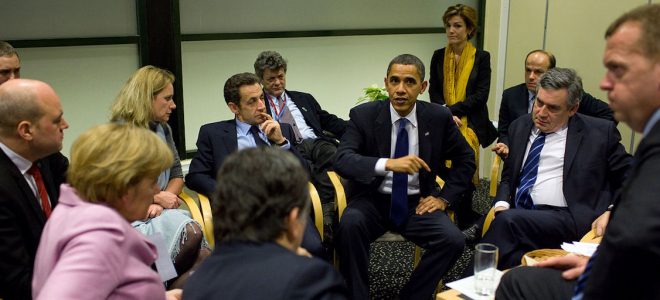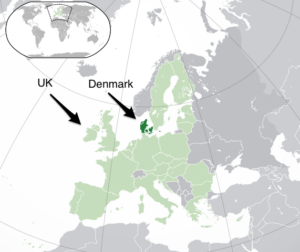

Mark Herron has a PhD in rhetoric from Copenhagen University. As part of his graduate program he studied for one year at UC Santa Barbara and a semester at UI Champagne-Urbana. He regularly contributes analysis of political rhetoric to Danish newspapers, television stations and websites.
Denmark shares Great Britain’s sceptical view of the European Union, but the size of the country and positioning of its political parties shape attachment to — or opposition to — multi-state political institutions on the European continent.
Back in June of 1992, Denmark sent its own political shock wave through the European Union. The small country of little more than five million citizens had voted a narrow “no” on the Maastricht Treaty, 50.7 percent to 49.3 percent. The problem with the result was that all of the EU countries had to accept the treaty in order for it to be ratified and become the next step in the Union’s integration in the post cold-war era.
Just as with Great Britain’s recent Brexit vote, Denmark’s EU-vote took place around the time of the European Cup in soccer, but instead of losing to Iceland —and dealing with the mixed sense of nationalistic pride that followed — Denmark actually managed to beat none-other than Germany in the final match of the 1992-tournament. Following the election loss and soccer victory, the Danish foreign minister at the time, Uffe Ellemann-Jensen, quipped on his way to a meeting in the EU — “if you can’t join them, beat them.”
The summer of ’92 left Denmark with a sense of justified resistance to the EU, in spite of its size, and a special deal was struck, which included a constitutional right for Denmark to abstain from converting the national currency to the Euro. The only two countries that have this deal within the EU are Great Britain and Denmark. For this reason and others, Denmark is regretful about the prospect of Great Britain leaving or at least diminishing its membership role in the EU.
DANISH AND BRITISH VIEWS OF THE EU
The Danes consider their relationship to Britain to be a special one within the EU for several reasons. One is historic: at the end of World War II it was British troops, led by Field Marshal Bernard Montgomery, who liberated Denmark from five years of German occupation. In more recent times, Denmark has found a good export market in Great Britain for proud nationalistic products such as bacon, beer and Lego.

Denmark also shares many of the concerns that led the Brits to vote for Brexit: The increased immigration from both Eastern EU countries and from war-torn areas south of Europe has led to the rise of the Dansk Folkeparti, whose core politics focus on decreased immigration and securing the Danish borders as much as possible within the EU. The transferring of welfare benefits across borders in the EU also plays into the frustration Danes feel about the EU’s open borders, where the sense is that Denmark receives far less than it pays to other EU-countries.
Almost all of the political parties in Denmark that have traditionally supported the EU project lost seats in the recent general election in 2015. Yet that election should also be seen as a broader showdown between the national elite and their electorate in the major metropolitan areas of Denmark vs. the countryside, where populist parties like the Dansk Folkeparti won support to a greater degree and claimed to speak for the ordinary, decent people fed up with the political class.
WHY BREXIT WON’T TURN INTO A DEXIT
Both the Brexit vote and England’s loss to Iceland in soccer have been greater national shocks to the UK than anything Denmark experienced 24 years ago. And while Denmark stands with Britain on a great many issues concerning the problems of EU, the idea of a “Dexit” vote is not considered at the moment — in spite of what UKIP’s Nigel Farage enthusiastically hinted at with his speech on the morning after the Brexit vote, suggesting that the domino theory would set into effect almost immediately across the European continent, and include countries like Holland, France and Denmark.
Even the Danish member of the European Parliament for Dansk Folkeparti, Morten Messerschmidt, a perpetual critic of the EU, stated that he was worried about the instability that the Brexit vote might cause on continental Europe: “I am very worried about what will happen with Europe, if Marine Le Pen becomes president in France, what will happen with Jobbik in Hungary, and the right and left wing extremist movements in general that are emerging.”
The fact that Denmark’s version of these nationalistic parties distances itself from its EU-equivalents says a lot about the Danish approach to the current EU crisis. Dansk Folkeparti would have preferred Britain take the deal the EU offered so that Denmark could demand a similar arrangement, much like the negotiations that followed the 1992 referendum, where Denmark later voted yes to a deal in 1993 which met the demands of the EU-skeptics.
In the view of most Danes, the EU, for all its faults, still represents stability for smaller European nations, as the current Danish Prime minister, Lars Løkke Rasmussen, stated: “The result of the British referendum does not change the fact that Denmark belongs in the EU. It is Denmark’s best option for making an impact on the world, which we, for good and bad, are a part of.”